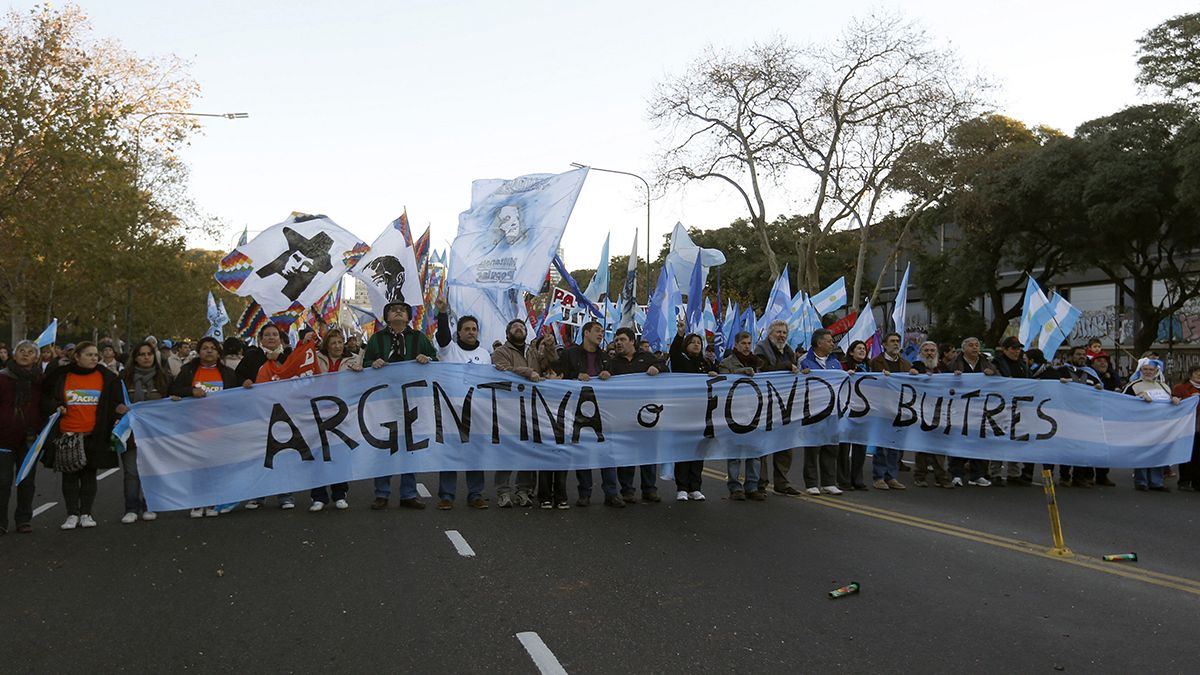The Argentinian government and two hedge funds involved in a debt restructuring dispute have agreed to meet for a second time with a US court mediator in an attempt to resolve a 12-year legal battle.
The parties must find a solution to the problem by the end of July or Argentina risks a catastrophic $95bn default.
In 2002 Argentina was involved in a default, then the world’s biggest,
The so called ‘vulture funds’ moved in and bought Argentinian government bonds at rock bottom prices.
Argentina then negotiated a deal to restructure its debt with close to 93 percent of its creditors, except for the holdout investors,that had demanded repayment in full.
In June a US court ruled Argentina must repay the entire $1.3bn of debt plus interest to the hedge funds.
Buenos Aries refused and attempted to pay only those investors, which agreed to the restructuring.
The US courts blocked the payments saying Argentina must treat all creditors equally.
Argentine officials have said the country will not pay the holdout investors, arguing it could face potential demands for up to $17bn from others not involved in this case – an amount representing more than half of the government’s $28.5 billion in foreign currency reserves.
The dispute has now moved into the court of public opinion with both sides taking out adverts in the world’s major newspapers.
Argentina claims it is being pushed into debt at a time when the country is slipping into recession and accuses the hedge funds of blatant profiteering.
Finance Minister Axel Kicillof insists Argentina wants to repay the debt: “Argentina paid, wants to continue paying under reasonable conditions, under feasible conditions, but we’re facing a situation where we’re not being allowed to do that. Just one percent are endangering the agreement that was agreed upon by all the other bondholders.”
Despite the tough public stance from both parties the markets believe a deal will be done.
Euronews business reporter Vicenç Batalla spoke to Fausto Spotorno, Chief Economist with Orlando Ferreres and Associates in Buenos Aires.
euronews: “What is the the probability Argentina’s government will again default on its debts as it did in 2001? Will there be an agreement in the US by July the 30th?”
Fausto Spotorno: “I think the likelihood of Argentina defaulting is very small – very very small. The reality is that no country is going to commit this kind of financial suicide. A default would not suit Argentina, it would not suit the holdouts, it wouldn’t suit any body. And it doesn’t seem too difficult to find a solution. It is technically complex, but from a political point of view it doesn’t seem too complicated.”
euronews: “And does Argentina have sufficient reserves to pay, we’re talking $15 billion, including interest?”
Fausto Spotorno: “In cash, no. Argentina’s reserves right now are a little over $29 billion. Using $15 billion to pay for this lawsuit would be too much.
“The figures we have are: there’s $1.5 or $1.6 billion from this particular law suit. Then there’s another $10 billion worth that’s the subject of legal proceedings now, and can be quickly sorted out in the way that this solution has been reached.
“In addition there is still five billion dollars which is not yet the subject of legal proceedings in New York, or that has not even presented for swaps – debt exchanges. Out of the $17 billion at current values, only fifteen billion will be subject to a final judgement and receive one hundred percent of the value of the bonds.
“As Argentina doesn’t have the cash reserves, it will have to issue some sort of debt, or find someone to finance Argentina paying out these judgements. In fact, just the rumor that Argentina is currently resolving the problem of the holdouts made the bonds rise and the interest rates fall.”
euronews: “This is happening exactly when Argentina is not in a very good economic state. Do you think the stance taken by President Cristina Fernández is the most appropriate?”
Fausto Spotorno: “No, I don’t think so. I think this default situation has been mismanaged since 2001 when it started up until now. Argentina made a mistake when it announced a default without being legally ready to deal with it.
“Then, it waited too long to offer a first swap (debt restructuring) and when it eventually did a first swap it was only accepted by 76 percent of debt holders.
“For those bonds – that required 100 percent repayment – I think that was very low. In fact, all these hedge funds that launched legal proceedings and won against Argentina, are funds that bought the bonds after the first swap. If Argentina had managed the first swap in 2005, better than it did, probably what happened later would not have occurred.”
euronews: “One last question that I have to ask, as Argentina has reached the final of the World Cup, if the team wins, will that have a beneficial effect on the country’s economy?”
Fausto Spotorno: “No. This can help the president’s image – for at the most a month! But Argentina is dealing with recession, with job destruction at least in the legal economy and with rampant inflation. Inflation this year will reach nearly 40 percent. Right now it’s already at an annual rate of 41.4 percent. So any benefits of a World Cup victory would soon disappear.”


